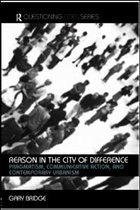Table of contents:
1. Reason in the City of Difference 2. On the Body 3. On the Street 4. In the Community 5. In the Public Realm 6. At Home and Work in the Urban Economy 7. In City Hall 8. Cosmopolitan Reason and the Global City
In the modernist city rationality ruled and subsumed difference in a logic of identity. In the postmodern city, reason is abandoned for an endless play of difference. Reason in the City of Difference poses an alternative to these extremes by drawing on classical American philosophical pragmatism (and its contemporary developments in feminism and the philosophy of communication) to explore the possibilities of a strengthening and deepening of reason in the contemporary city. This is a transactional rationality based on communication, rather than cognition, involving bodies as much as minds, and non-discursive, as well as discursive competences. It is a rationality that emerges out of difference and from within the city, rather than over and above it.
Using pragmatist philosophy and a range of suggestive examples of urban scholarship, this fascinating book offers a new, alternative reading of the city.
This book re-establishes a notion of conscious agency in our understanding of urban life. Using empirical examples and drawing on pragmatist ideas of 'experience' and rationality, this text offers a new, alternative reading of the city.
1. Reason in the City of Difference 2. On the Body 3. On the Street 4. In the Community 5. In the Public Realm 6. At Home and Work in the Urban Economy 7. In City Hall 8. Cosmopolitan Reason and the Global City
In the modernist city rationality ruled and subsumed difference in a logic of identity. In the postmodern city, reason is abandoned for an endless play of difference. Reason in the City of Difference poses an alternative to these extremes by drawing on classical American philosophical pragmatism (and its contemporary developments in feminism and the philosophy of communication) to explore the possibilities of a strengthening and deepening of reason in the contemporary city. This is a transactional rationality based on communication, rather than cognition, involving bodies as much as minds, and non-discursive, as well as discursive competences. It is a rationality that emerges out of difference and from within the city, rather than over and above it.
Using pragmatist philosophy and a range of suggestive examples of urban scholarship, this fascinating book offers a new, alternative reading of the city.
This book re-establishes a notion of conscious agency in our understanding of urban life. Using empirical examples and drawing on pragmatist ideas of 'experience' and rationality, this text offers a new, alternative reading of the city.

